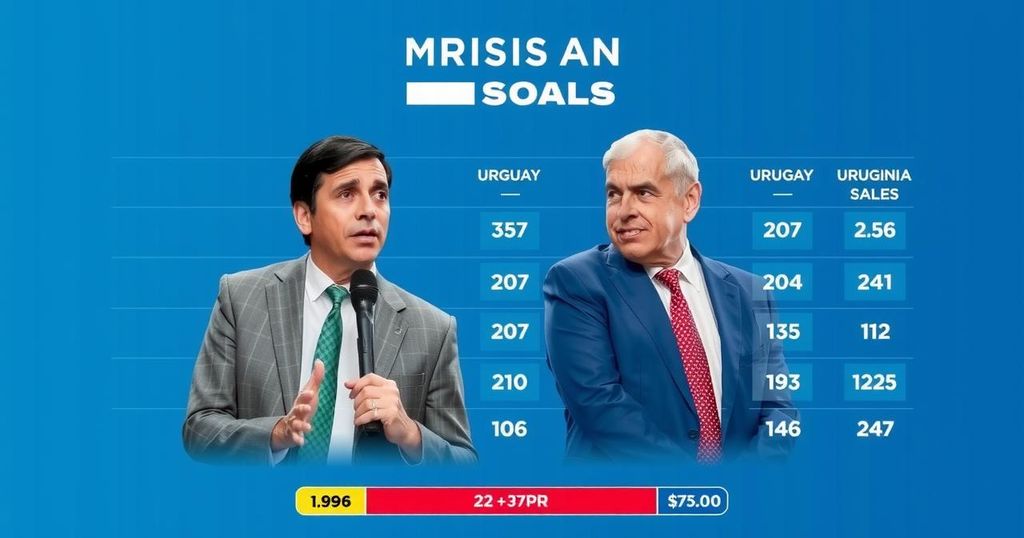Yamandú Orsi Wins Presidential Runoff in Uruguay, Signaling Political Shift

In Uruguay’s recent presidential runoff, Yamandú Orsi of the Broad Front emerged victorious over conservative candidate Álvaro Delgado. Orsi’s win, confirmed with 784,523 votes to Delgado’s 771,434, marks the return of leftist governance after a brief conservative tenure. Orsi plans to maintain moderate policies while addressing pressing social issues, amidst a growing global trend of voter dissatisfaction with incumbent administrations.
In a closely contested presidential runoff in Uruguay, Álvaro Delgado, the representative of the conservative coalition that has governed the country for the past five years, conceded defeat to left-wing challenger Yamandú Orsi on Sunday. Delgado, addressing his supporters, expressed his sentiments, stating, “with sadness, but without guilt, we can congratulate the winner.” With approximately 784,523 votes in favor of Orsi compared to 771,434 for Delgado, electoral officials confirmed Orsi’s victory amid ongoing ballot counting.
This transition marks the end of a short tenure for the center-right government, which began in 2020 with the election of President Luis Lacalle Pou and was notable for reversing 15 years of Broad Front leadership, a period characterized by significant social reforms such as the legalization of abortion and same-sex marriage. Following the victory, the Broad Front declared that “Joy will return” as they welcomed Orsi as the new president.
Lacalle Pou congratulated Orsi on his win, underscoring his willingness to facilitate a smooth transition. This election is part of a global trend of voters expressing dissatisfaction with incumbent parties, pointing to economic challenges following the pandemic. Unlike some of his contemporaries, Orsi’s platform does not advocate for radical changes; instead, he aligns with his predecessor on key matters like addressing childhood poverty and organizing crime control, maintaining a blend of market-friendly policies.
Despite past popularity, the current government faced criticism as voters expressed frustration over stagnant wages and rising crime. Consequently, analysts suggested that undecided voters played a decisive role in the election outcome, particularly given the lack of appealing campaigns that resonated with younger demographics. Both candidates pledged cooperation post-election, reflecting a commitment to national unity, with Orsi referring to the electoral process as “an incredible experience.”
This election signifies a return to power for the Broad Front, reflecting Uruguay’s characteristic political stability through a contentious yet democratic process.
Uruguay has a well-documented history of political stability, with a tradition of moderate governance. The recent presidential election highlights the nation’s shifting political landscape, as voters sought change following economic challenges stemming from the pandemic. This runoff represents not only the transition of power from a conservative coalition back to a center-left government but also the culmination of a global trend where voters are increasingly discontent with the status quo, seeking leaders who align more closely with progressive and welfare-oriented agendas. Yamandú Orsi’s election is particularly notable given his background as a former history teacher and mayor, and his commitment to continuing some of the policies from the Broad Front’s previous administration. His win also reflects the lingering influence of former president José Mujica, whose progressive policies received international acclaim and helped establish a robust social framework in Uruguay that many voters wish to maintain.
The 2023 presidential runoff in Uruguay signifies a pivotal moment for the country as Yamandú Orsi of the Broad Front assumes leadership, succeeding Álvaro Delgado of the conservative coalition. The election highlighted widespread voter dissatisfaction with economic stagnation and social issues, leading to a clear demand for change. As Orsi prepares to govern, his moderate approach aims to build upon previous successes while addressing the concerns of the populace, ultimately fostering a collaborative political environment. This outcome not only reshapes Uruguay’s political narrative but also aligns with global trends of electoral shifts against incumbent parties.
Original Source: www.pbs.org






